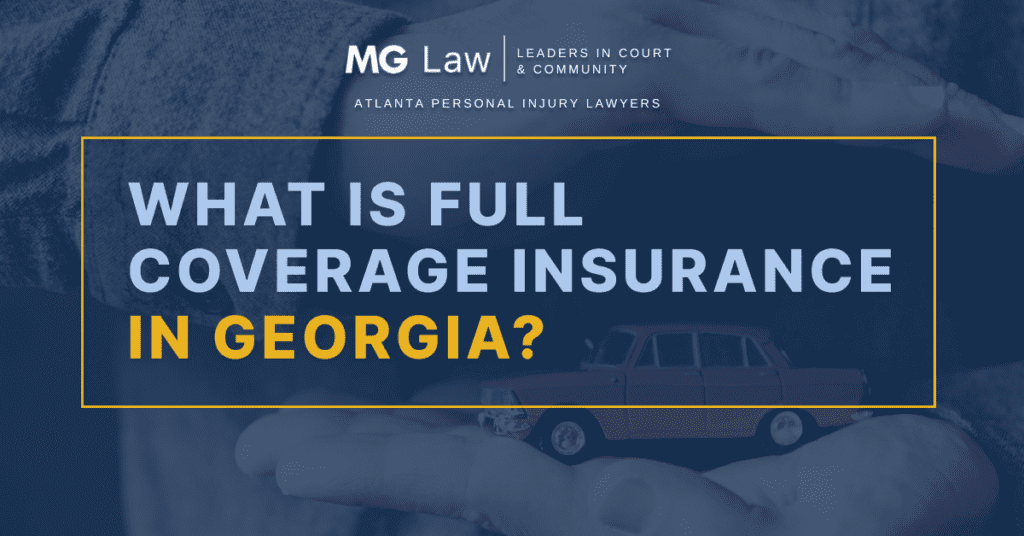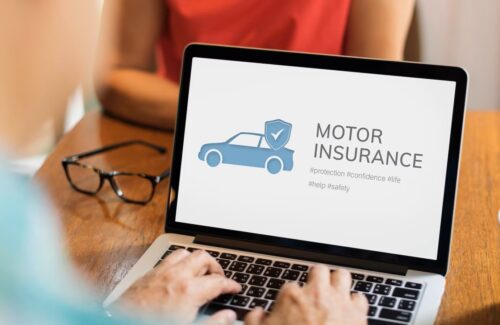
Many people use the term “full coverage,” but what does it mean?
In Georgia, all motorists must carry certain minimum insurance coverage. Full coverage insurance typically includes liability, collision, and comprehensive coverage. It may also include add-ons like roadside assistance and uninsured motorist protection, providing a comprehensive safety net for drivers.
Without this insurance, a driver cannot register their vehicle, and they could face other penalties if they are involved in an accident without proper insurance.
But minimum coverage leaves motorists vulnerable after many wrecks.
There is no agreed definition of what qualifies as “full coverage” insurance in Georgia. However, speaking generally, full coverage car insurance combines the state’s minimum liability coverage along with collision and comprehensive coverage.
There are many reasons to get full coverage, though costs are always a concern.
Our Covington, Georgia auto accident lawyers will explain what you should know. For a free consultation, please don’t hesitate to contact us online or call (770) 988-5252 today.
Minimum Liability Coverage

Georgia is a “fault” state when it comes to car accidents. Georgia law requires a minimum limit of liability insurance for bodily injury.
This limit is set at $25,000 per person and $50,000 per incident.
Under this system, a driver who is at fault for a wreck must pay compensation to those injured. Victims usually suffer two types of damage—bodily injuries and property damage.
Unsurprisingly, Georgia requires that motorists carry a minimum amount of liability insurance. As the name implies, this insurance will kick in when someone covered under the policy causes an accident. So if Driver A strikes Driver B, then Driver B will make a claim on A’s liability insurance policy to pay compensation.
Like other states, Georgia sets minimums that those registering a vehicle must have to comply with the law:
- For bodily injury liability, the minimum is $25,000 per person injured up to $50,000 per accident (when 2 or more people suffer bodily injuries). Bodily injury liability pays for medical care, replaces lost wages, and compensates for pain and suffering.
- For property damage, a driver must carry at least $25,000 in insurance. This will pay to repair or replace the victim’s damaged property, such as their car.
Combined, this is called 25/50/25 coverage, as it’s known in the auto insurance industry.
Because these are minimums, a driver could carry more coverage. For example, you might carry $100,000 in bodily injury liability coverage, up to $300,000 per accident. Of course, you will pay more in monthly premiums for more coverage.
But if you are at fault for an accident, the victim could sue you personally and, if he wins, try to put a lien on your home or levy a bank account. The cost of medical care continues to skyrocket, so realize that $25,000 might not cover much.
Uninsured/Underinsured Motorist (UM) Coverage
Georgia law requires that any insurer who issues a liability insurance policy must include uninsured/underinsured motorist coverage (O.C.G.A. 33-7-11). They must provide policy limits equal to your liability insurance. So if you get a liability policy with 25/50/25 limits, then an equal amount must be offered of UM coverage.
These policies cover different situations:
- Uninsured motorist coverage. If the at-fault driver lacks insurance, then you can use this coverage.
- Underinsured motorist coverage. The driver might have lower policy limits, and you have unmet expenses. For example, you might carry $100,000 in uninsured motorist coverage, but the at-fault driver has the bare $25,000.
UM coverage is liability insurance, so it only kicks in when you are not to blame for the accident.
Do you need UM coverage? Consider that there are many uninsured drivers in Georgia—according to one estimate, at least 12%. That works out to nearly 1 in 8 Georgia drivers lacking insurance. UM coverage might be the only thing available if an uninsured driver hits you. You can usually make a claim on your UM policy if you are the victim of a hit and run, and the police never find the driver. Underinsured motorist coverage is helpful when you suffer heavy losses and the other driver has policy limits that are too low.
Georgia law allows motorists to reject UM coverage when they pick up the required liability policy. But we want to discourage any motorist from rejecting coverage. Your UM insurance might be the only policy available to pay compensation after many accidents.
Collision & Comprehensive Coverage
To get “full coverage” auto insurance in Georgia, you should get collision and comprehensive coverage.
These policies are different from liability insurance because they are no fault insurance. This means you can be to blame for the wreck or damage to your vehicle, but you can still make a claim to get your car fixed. That makes them greatly beneficial to have.
They are distinct policies:
- Collision. This insurance pays to repair or replace a car that is damaged in a collision. It includes striking another vehicle or running off the road and hitting an object, like a pole or house.
- Comprehensive. This policy will cover the cost to repair or replace a vehicle damaged by something other than a collision. The policy will cover damage from storms, natural disasters, fire, vandalism, theft, and flood.
Let’s say you get into an accident, which is your fault. You cannot make a claim on your liability insurance or the other driver’s liability insurance because you are to blame. However, you could tap your collision coverage to get your car fixed.
Most lenders require that borrowers carry both collision and comprehensive on a car loan. These policies protect the lender’s investment since the car serves as collateral for the loan. If the car were wrecked, it would have little value.
Costs vary for collision and comprehensive. Generally, you could pay several hundred dollars more a month, depending on your driving history and the amount of your deductible. You should contact an insurance agent or request online quotes.
Should you get comprehensive and collision coverage if you don’t have a car loan? It’s really up to you. You might like the added protection just in case you crash.
However, make sure this coverage fits your budget.
Medical Payments Coverage
Thus far, we have looked at liability insurance that covers injuries to other people, and comprehensive/collision insurance which pays to repair your vehicle regardless of fault. But what about bodily injuries you suffer when you cause an accident?
This is where medical payments coverage comes in. This insurance will pay for medical treatment for victims regardless of whether you were to blame for the accident. It can also pay for medical care to any of your passengers who were injured.
Medical payments coverage is optional in Georgia, but it is definitely something you should consider if you are trying to get full coverage.
Generally, insurers offer at least $2,000 in coverage but policies can go up to $10,000. Of course, your monthly car insurance premium will also increase.
You might wonder why someone would get medical payments coverage if they have health insurance. After all, your health insurance should cover the cost of medical care, even if you are responsible for the accident.
However, some people have health insurance policies with high deductibles. You can use medical payments coverage to pay for the deductible. You might also want the added protection of knowing you have coverage if you cause a wreck and injure a passenger.
Two thousand dollars in coverage might not sound like much, but every bit is helpful after an expensive collision.
Contact Our Georgia Accident Attorneys Today With Questions
MG Law helps injured motorists obtain compensation following an accident. Our legal team can help if you are negotiating with another motorist’s liability carrier, or if you were struck by an uninsured driver and need to make a claim on your UM policy. We might be able to help in other claims, depending on the circumstances.
Please contact us online or call (770) 988-5252 today.
Our lawyers are willing to discuss your options for getting the compensation you need. We offer free, confidential consultations that are completely no risk.


